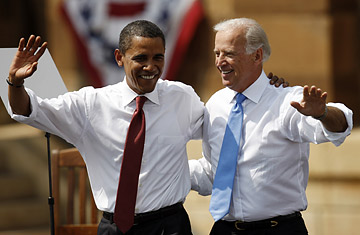
Barack Obama introduces his running mate in Springfield, Illinois
The day Joe Biden officially launched his 2008 presidential run in February of 2007, he virtually ended it with a classic Biden gaffe — this one involving the man on whose ticket he'll be a part of in the race for the White House. "I mean, you got the first mainstream African-American who is articulate and bright and clean and a nice-looking guy," Biden said, apparently oblivious to his implied slur of previous African-American politicians. Although Obama brushed aside the comment, other prominent African-Americans and much of the Washington political class came down hard on Biden. He apologized and Obama accepted, but Biden never gained traction, and dropped out of the race after the Iowa caucuses, a year later.
Biden's gaffe made him an unlikely running mate, and much will be made of the bridge-building that Obama's choice represents. But in the end, Obama picked him for the simplest of reasons: The six-term Senator from Delaware is strongest in areas where the freshman from Illinois is weakest. Biden's tenure in the Senate, his foreign policy expertise, his religion, and his suburban middle-class background, all fill gaps in Obama's own presidential profile.
Most of all, where Obama is reserved and cautious in a political knife-fight, Biden comes out swinging. Tapping Biden is a signal that the Obama campaign is ready for a battle — and to take the risks that come with it.
Biden's experience is his biggest asset. His 36 years in the Senate have earned him chairmanships of the Judiciary and Foreign Relations committees, positions he has used to establish himself as a familiar and respected, if partisan, spokesman for the Democrats on everything from Supreme Court appointments to complex national security issues during and after the Cold War. Obama's lack of comparable experience has him trailing John McCain by as much as 15 points on some foreign policy issues; if a vice-presidential pick can offset voters' concerns on those issues, Biden's resume should help.
Obama also needs help with key voting blocks such as Catholics and white, blue-collar swing voters. Biden ranks with Ted Kennedy among the Senate's best-known and longest-serving Catholics. Although he comes from a middle class family, his pro-union, moderate-to-liberal voting record and Irish-American family background give Biden popularity with working class and ethnic voters. Although Delaware has only three Electoral College votes, Biden's background could help garner a few more next door: Biden lived in Pennsylvania until age 10, and a grandfather served as a State Senator there.
Biden's personal story is solid and compelling. His father was a car salesman and his mother raised him, his two brothers and a sister. He went to school and practiced law in Delaware before running for local government and winning an upset Senate victory in 1972. While Christmas shopping a month later, his wife and daughter were killed in a car accident that also injured his two sons. Biden almost resigned, but was convinced by Senate leaders to take the position, and has commuted daily to Washington ever since.
Biden led the Judiciary committee through the contentious confirmation hearings for Judge Robert Bork, and spent much time locking horns with Jesse Helms on the Foreign Relations committee. His prescriptions for U.S. foreign policy have been sometimes controversial — he supports dividing Iraq into three autonomous regions, for example. But he is accepted as an expert and respected on both sides of the aisle.
Biden's biggest edge in the homestretch may have come, paradoxically, from his greatest liability: his personality. Obama is charismatic, but in tough political confrontations he can be cautious and reserved. A running mate who can add passion to the coming battles, Biden has a fire-in-the-belly quality Obama lacks. That spunk first vaulted Biden to the Senate by a narrow margin in 1972 over an aging incumbent, and it also gave him an edge over the more sedate finalists for the ticket, Indiana's Evan Bayh and Virginia's Tim Kaine.
The history of Biden's gaffes, however, show the risks of naming him to the ticket. He was forced out of the race for President in 1988 after Michael Dukakis' campaign leaked evidence that Biden had plagiarized a speech from British Labour Party leader Neil Kinnock, and in doing so had misrepresented his own class background. In June 2006, Biden offended Indian-Americans when he claimed a great relationship with them thanks to the fact that in Delaware, "You cannot go to a 7-Eleven or a Dunkin' Donuts unless you have a slight Indian accent." Six months later he made the infamous comment about Obama's cleanliness.
It's a measure of how badly the last month has gone for the once high-flying Obama campaign that they're willing to risk taking on board a shoot-from-the-lip running mate like Biden. And in a race that is growing tighter with every poll, that risk could make a real difference — for better or for worse.
